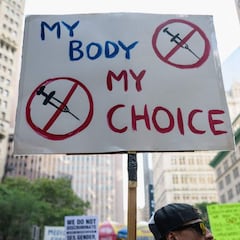Which Democrats are pushing to extend unemployment benefits? Who are against?
Progressives are contemplating pushing for an extension of federal jobless aid set to expire, but insufficient support in the Senate may sink any proposal.

Democrats in the House of Representatives have a deadline to write up their $3.5 trillion spending package based on President Joe Biden’s proposals to expand the US social safety net. Progressives have threatened to sink the $1 trillion bipartisan infrastructure bill passed by the Senate if the larger spending bill isn’t passed first in the lower chamber.
House Speaker Nancy Pelosi agreed to put the smaller package to a vote by 27 September under pressure from centrists in the party. The final proposal that Democrats draw up will need to content both progressives and centrists and be able to garner all 50 votes Democrats have in the Senate, Republicans have already said they will not support the legislation, if it is to be enacted. One measure, extending federal unemployment benefits due to expire 6 September, may be a bone of contention.
Also see:
- Flordia judge to give ruling over unemployment lawsuit on Friday
- States can use stimulus funds to extend unemployment benefits
- What does $3.5 trillion reconciliation plan include?
- "Modest" increases in employment seen in states that ended federal UI benefits
Progressives contemplating including federal unemployment jobless aid extension
Democrats have been saying that extending the unemployment benefits past the 6 September cutoff is most likely not in the cards as they assemble their $3.5 trillion reconciliation package. Insider reports that the proposal has so far been absent from the negotiations according to Representative John Yarmuth, the House Budget Committee Chair. However, that may change as the 96-member Congressional Progressive Caucus are discussing whether they should put their weight behind a renewal.
Speaking to Insider three members of the Progressive Caucus have expressed support, but Representative Ilhan Omar, the caucus Whip, said “we will gauge with our caucus to see what we are willing to do in negotiating for that." Adding “we haven't whipped on that as the progressive caucus yet."
Newsflash: Cutting unemployment insurance benefits did not boost job growth, but it did cause suffering for millions of jobless workers—all of which was preventable. https://t.co/hlg7rfrulj
— Economic Policy Institute (@EconomicPolicy) August 25, 2021
Representatives Cori Bush and Alexandria Ocasio-Cortez also expressed support for an extension. Ocasio-Cortez who said the programs ending is a "major concern," recognized that it won’t be easy going. "We have a Senate that doesn't want to do it, a White House that doesn't want to do it — it's going to take a very committed House," she said.
Skepticism in the Senate
Once the partisan bill passes the lower chamber, where Democrats only have a three-seat majority, the $3.5 trillion reconciliation bill must get through the Senate split 50-50. There, any measure to extend the federal unemployment programs will face stiff opposition in the Democrat caucus. Insider reports that some of members that caucus are skeptical about continuing the enhanced jobless aid.
Senator Joe Manchin has already said earlier this month that he would not back extending the Pandemic Unemployment Assistance (PUA) or Pandemic Extended Unemployment Compensation (PEUC). “The economy is stronger now, the job market is stronger. Nine million jobs we can't fill. We're coming back,” he said. Adding “I'm done with extensions.” He held up the vote on the American Rescue Plan until it was agreed to shorten the duration of the federal benefits programs by over a month.
Independent Senator Angus King who caucuses with Democrats has also expressed doubts about the programs. "Right now, there's something like 8 million unemployed people and 10 million open jobs," he said.
NEW: Millions of Americans face financial cliff as eviction ban, unemployment aid lapse amid Washington inaction.
— Tony Romm (@TonyRomm) August 27, 2021
Simply put, the WH can't reissue moratorium, and neither WH or Congress are going to renew benefit boosthttps://t.co/Buvc4hv0M1
There is optimism that an extension could be in the works, speaking to Insider about Manchin’s opposition Senate Finance Committee Chair Ron Wyden said "During the summer break, I believe senators are going to hear from these gig workers," and others “who are really hurting and just not getting significant numbers of economic opportunities in this economy.” He said that in pressing for the continuing the jobless aid programs "we're going to put out all the stops."
What’s at stake when the federal unemployment benefits end
Related stories

Unemployment benefits lawsuit in Florida: what's the situation ahead of September?
The latest data from the Department of Labor shows that around 12 million people were collecting some form of unemployment in early August. Nearly 8.8 million were collecting benefits from either the PUA or the PEUC. Last week there was a slight uptick in the number of initial claims, the first time in five weeks.
The vast majority of those on the federal programs will go over a benefits cliff in September. Andrew Stettner, from the Century Foundation, estimates that 7.5 million people will lose all unemployment compensation when the federal programs expire. Some will still be eligible for Extended Benefits if they haven’t already exhausted all their weeks from that jobless aid. But the Century Foundation predicts that “only Alaska, Connecticut, New Jersey, and New Mexico will be able to transition exhausting PEUC recipients onto EB, but with 50 percent state funding.”
- Alexandria Ocasio-Cortez
- Unemployment compensation
- United States Senate
- Partido Republicano EE UU
- Covid-19 economic crisis
- Science
- Unemployment
- United States Congress
- Coronavirus Covid-19
- Economic crisis
- United States
- Partido Demócrata EE UU
- Pandemic
- Coronavirus
- Recession
- Employment
- North America
- Parliament
- Economic climate
- Virology
- Outbreak
- Infectious diseases
- Political parties
- Diseases
- Microbiology
- Work
- Economy
- Politics
- Biology
- Health
- Life sciences
- Medicine

